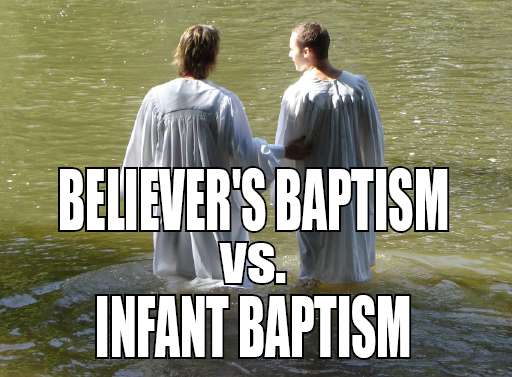

Believer's Baptism vs. Infant Baptism
Pr. Sunny Kurian
One among the two sacraments of the New Testament Church is Baptism - a much debated topic in the History of Christianity. A goldsmith does not pronounce any metal as gold by its outside color. He must first test it with a touchstone. Likewise, the use of the term ‘baptism' or the use of the water or the words of the priest won’t make a ceremony the real baptism. To understand what the real baptism is we have to use the touchstone, i.e. the Bible. Justifications, imaginations or traditions cannot prove or validate baptism in the light of the Word of God. The main debate is on the time and the type of baptism. Let's look at what the Bible teaches on the subject.
The importance of Baptism
1. Baptism is the counsel of God (Luke. 7:30)
2. It is the commandment of God (Matt. 28:16-20; Mark 16:15,16)
3. Baptism is shown by Jesus as a model of mankind (Matt.3:13-17)
4. It is apostolic teaching (Acts. 2:38)
5. It is the practice of the Church (Acts.2:41)
6. It is the fulfillment of the righteousness of God (Matt.3:15)
Best time or the age for Baptism
Baptism is for those who have accepted Jesus as their personal savior and have committed to become the disciples of Jesus. And He said to them: “Go into the entire world and proclaim the good news to the whole creation. The one who believes and is baptized will be saved” (Mark 16:15, 16). One has to believe in the Gospel, which is preached. Mathew 28:18ff says, And Jesus came and said to them, “All authority in heaven and on earth has been given to me. Go therefore and make disciples of all nations, baptizing them in the name of the Father and of the Son and of the Holy Spirit and teaching them to obey everything that I have commanded you…”
Many misunderstand this verse and argue that people first have to be baptised and then only be taught and made disciples. But the correct translation says that we have first make them disciples and thereafter they are baptized. There are many other translations which support this view. The apostles also taught the people to believe first and then be baptized.
Peter said to them, “Repent and be baptized every one of you in the name of Jesus Christ”( Acts 2:38). So those who welcomed his massage were baptized (Acts 2:41), but when they believed Philip, who was proclaiming the good news about the Kingdom of God and the name of Jesus Christ, they were baptized ( Acts.8:12).
Paul said, "John's baptism was a baptism of repentance. He told the people to believe in the one coming after him, that is, in Jesus" ( Acts 19:4). In the early church the apostles and the ministers had baptized only those who had a personal repentance experience. There is no Bible verse to support or prove infant baptism. Pouring or sprinkling of water on the head of a child is unbiblical and a an accursed act. "But even if we, or an angel from heaven, should preach to you a gospel contrary to what we have preached to you, he is to be accursed! As we have said before, so I say again now, if any man is preaching to you a gospel contrary to what you received, he is to be accursed!" ( Gal.1-8-9)
The Mode and Manner of Baptism
The mode of baptism must be immersion. The Greek word for baptism is 'baptizo'; in Hebrew it is 'tabal'; in Syriac 'Mamothisa' all of these words refer to 'immersion' or 'completely covered under water', clearly conveying the Biblical meaning of baptism.
John the Baptist conducted baptism by immersion and our greatest example of this is Jesus Himself, who submitted to being baptized in this manner (Matt.3:11, Mark: 1:8, Acts.1:8, Matt.3:16). This is made clear in the Syriac translation. The Ethiopian eunuch's baptism by immersion clarifies to us the stand and practice of the early church. “And he ordered the chariot to stop; and they both went down into the water, Philip as well as the eunuch, and he baptized him. When they came up out of the water, the Spirit of the Lord snatched Philip away; and the eunuch no longer saw him, but went on his way rejoicing”. This method of baptism cannot be changed. Baptism that the Bible shows the baptiser and the baptized being wet by water. The Bible is unchanging; likewise Biblical teaching never change.
The Purpose of Baptism
Baptism, a command of the Lord signifies the following:
1. Baptism is to join with Christ. (Rom.6:3; Gal.3:27). None has joined Jesus who has not been baptized (immersion baptism) in the name of the Triune God following the faith in Jesus. They may be members of the Church organizations, but are not members of the Church.
2. It shows the death, burial and resurrection of Jesus Christ (Col.2:12; Rom.6:4,5)
3. It is prayer for a good consciousness ( 1 Pet.3:21)
4. It is the fulfillment of God’s righteousness (Luke. 7:29)
5. To clothe ourselves with Christ (Gal.3:27).
6. To walk in the newness of Christ (Rom.6:5).
7. To show the love for Jesus, our Lord. (John 14:15, 21, 23, 24).
If you have not yet obeyed this very meaningful and holy command of our Lord, I pray that you will submit to do so without any delay.
Arguments and debates on Infant Baptism
The following seven points are put forward by those who support infant baptism:
1. Original Sin
The false doctrine of infant baptism is based on the Roman Catholic and Jacobite churches teaching about the Adamic sin or the sin by birth. If it is so, what is the gain through the Cross of Christ? Tertullian, the Church father had rejected the doctrine of Adamic sin and the infant baptism.
Jesus’s death on the cross brought remission of sin for all mankind, including the remission of the original sin / Adamic line into which we are born. "But if we walk in the light, as He is in the light, we have fellowship with one another, and the blood of Jesus, his Son, purifies us from all sin." (1 John 1:7). It is foolishness to think that the original sin is forgiven by infant baptism and the sin by deed is forgiven by Jesus’ death on the Cross. It disparages the importance of the blood of Jesus. “And by that will, we have been made holy through the sacrifice of the body of Jesus Christ once for all.” (Hebrew 10:10).
2. Circumcision
Circumcision is not a type or shadow of baptism. It is the shadow of the repentance in one’s heart. A person is not a Jew who is one only outwardly, nor is circumcision merely outward and physical. No, a person is a Jew who is one inwardly; and circumcision is circumcision of the heart, by the Spirit, not by the written code. Such a person’s praise is not from other people, but from God.” (Rom.2:28,29).
3. Believing for others
In infant baptism, an adult believes for the infant, because it has no ability to believe. The Bible never attests this doctrine. Personal faith is necessary for salvation. “Yet to all who did receive him, to those who believed in his name, he gave the right to become children of God” ( John 1:12).
4. Entrance to God’s Kingdom
The teaching that ‘if a child dies before it receives baptism will go to hell’ leads to the doctrine of infant baptism. In the Old Testament we have evidence that when the child of David died, he hoped to see the child again in heaven. In the New Testament we see that Jesus blessed the children and affirmed that theirs is the Kingdom of God.
5. The authority of the Church.
The question of whether the Bible or the Church is more powerful prevails here. Those claiming that the church has more authority than the Bible, declared authoritatively that infant baptism was the right practice.
But we believe the truth that the Bible is the authority we must uphold. The church’s authority is only the authority which the Bible gives.
6. The authority of the sacraments
Some churches believe that there is special authority and power for the sacraments. Hence the sacrament of baptism to infants is observed and believed to bring salvation to infants. If it be true, then the next question that arises as to why infants or children not permitted the so called sacraments of ordination and marriage. If maturity and knowledge is necessary for ordination and marriage, how much more maturity and knowledge is needed for baptism.
7. Family Baptism
The argument here is that there are references in the Book of Acts that families were baptized together.( Acts 16:15, 16:31-34;10:44-48; Acts 18:8;1 Cor.1:16;) In all these contexts those who were baptized were old enough to be addressed as brothers. (Acts 16:14).Those who were baptized in the household of Cornelius had the ability to listen to the gospel and believe.
All these evidences from the Bible and the practice of the church make it clear that believers’ baptism is Biblical while infant baptism is unbiblical.



